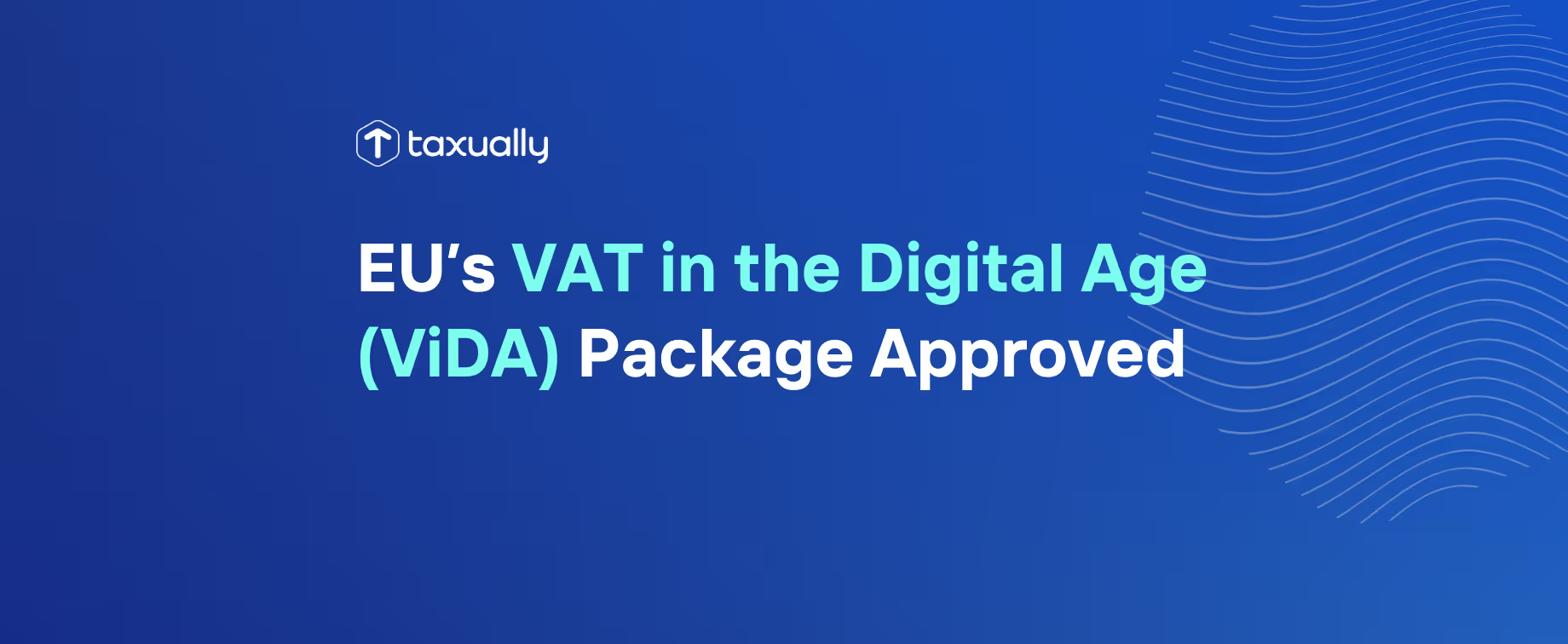Key takeaways
- The EU’s ViDA package was officially approved by ECOFIN on November 5, 2024, marking a major step toward digitalizing VAT compliance across the EU.
- The reform introduces key changes in e-invoicing, single VAT registration, and platform economy VAT rules, with extended timelines to help businesses adapt.
- Businesses should prepare early by auditing systems and adopting scalable e-invoicing and reporting tools to stay compliant ahead of ViDA’s phased rollout from 2025 to 2035.
ECOFIN officially approved the much-anticipated VAT in the Digital Age (ViDA) package on November 5, 2024. This transformative framework introduces new regulations across three key areas: e-invoicing, single VAT registration, and platform economy VAT obligations. The approval follows recent adjustments and compromises in the draft published on October 30, 2024, signaling a significant step toward modernizing the VAT framework across the EU.
Key changes and compromises
One notable development in the final package is the extended timeline for compliance, particularly for e-invoicing and the deemed supplier rule. These adjustments aim to provide businesses with more time to adapt while maintaining the integrity of the proposed changes.
Additionally, Estonia, which previously opposed the deemed supplier rule citing challenges for SMEs in VAT recovery, has now endorsed the package. A critical change allows member states to exempt SMEs from the deemed supplier regime, offering more flexibility and addressing concerns about the rule's impact on smaller businesses.
ViDA implementation plan
In early 2025, following ViDA's approval, member states will be permitted to implement domestic e-invoicing without requiring prior authorization from the EU Commission.
By January 2027, the One-Stop-Shop (OSS) will be expanded to include cross-border energy supplies, such as natural gas, electricity, heating, and cooling.
In July 2028, the OSS will undergo further expansion to cover all B2C supplies of goods and services, as well as intra-EU stock transfers. Additionally, platforms will be required to adopt the mandatory deemed supplier rule, which was previously optional.
By July 2030, digital reporting requirements (DRRs) and e-invoicing obligations for intra-EU transactions will become mandatory. At the same time, harmonization of domestic DRRs will be introduced for obligations established after January 2024.
Finally, by January 2035, domestic DRRs introduced before January 2024 will be fully harmonized across member states, completing the integration process.
Next steps and business implications
With the package approved, the next stage involves reconciling the agreed text with the European Parliament, addressing any remaining differences from the original European Commission proposal.
For businesses, now is the time to take proactive steps. System audits and process evaluations are critical to ensuring compliance with the evolving requirements. Early adoption of scalable e-invoicing and reporting solutions will position companies to meet these challenges head-on and gain a competitive advantage in the digital economy.
Do you need help with your VAT compliance? Book a free call with one of our VAT experts to find bespoke solutions for your business, optimize your VAT costs, and reach millions of new potential customers.
Frequently asked questions
New Year's Day - 1/1/2024Memorial Day - 5/27/20244th of July - 7/4/2024Labor Day - 9/2/2024Thanksgiving Day - 11/28/2024Day after Thanksgiving - 11/29/2024Christmas Eve - 12/24/2024Christmas Day - 12/25/2024
What is the EU VAT in the Digital Age (ViDA) package?
The VAT in the Digital Age (ViDA) package is an EU-wide reform aimed at modernizing VAT rules through e-invoicing, single VAT registration, and platform economy obligations. Approved by ECOFIN in November 2024, ViDA introduces phased changes that will simplify cross-border VAT compliance and improve digital reporting across all EU member states.
When will the new ViDA rules take effect?
Implementation of ViDA will roll out gradually between 2025 and 2035. Key milestones include expanded One Stop Shop (OSS) rules in 2027 and 2028, and mandatory digital reporting and e-invoicing for intra-EU transactions by July 2030. Full harmonization across EU member states is expected by January 2035.
How should businesses prepare for ViDA compliance?
Businesses should start reviewing systems and processes now to ensure readiness for the upcoming e-invoicing and reporting obligations. Implementing scalable VAT compliance software and conducting internal VAT audits early will make it easier to adapt to ViDA’s digital-first tax framework and avoid costly compliance issues.



















